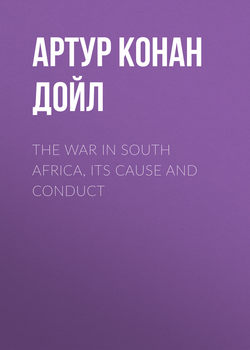Читать книгу The War in South Africa, Its Cause and Conduct - Артур Конан Дойл, Исмаил Шихлы - Страница 4
CHAPTER III
THE NEGOTIATIONS
ОглавлениеThe British Government and the British people do not desire any direct authority in South Africa. Their one supreme interest is that the various States there should live in concord and prosperity, and that there should be no need for the presence of a British redcoat within the whole great peninsula. Our foreign critics, with their misapprehension of the British colonial system, can never realise that whether the four-coloured flag of the Transvaal or the Union Jack of a self-governing colony waved over the gold mines would not make the difference of one shilling to the revenue of Great Britain. The Transvaal as a British province would have its own legislature, its own revenue, its own expenditure, and its own tariff against the mother country, as well as against the rest of the world, and Britain be none the richer for the change. This is so obvious to a Briton that he has ceased to insist upon it, and it is for that reason perhaps that it is so universally misunderstood abroad. On the other hand, while she is no gainer by the change, most of the expense of it in blood and in money falls upon the home country. On the face of it, therefore, Great Britain had every reason to avoid so formidable a task as the conquest of the South African Republic. At the best she had nothing to gain, and at the worst she had an immense deal to lose. There was no room for ambition or aggression. It was a case of shirking or fulfilling a most arduous duty.
There could be no question of a plot for the annexation of the Transvaal. In a free country the Government cannot move in advance of public opinion, and public opinion is influenced by and reflected in the newspapers. One may examine the files of the press during all the months of negotiations and never find one reputable opinion in favour of such a course, nor did one in society ever meet an advocate of such a measure. But a great wrong was being done, and all that was asked was the minimum change which would set it right, and restore equality between the white races in Africa. 'Let Kruger only be liberal in the extension of the franchise,' said the paper which is most representative of the sanest British opinion, 'and he will find that the power of the republic will become not weaker, but infinitely more secure. Let him once give the majority of the resident males of full age the full vote, and he will have given the republic a stability and power which nothing else can. If he rejects all pleas of this kind, and persists in his present policy, he may possibly stave off the evil day, and preserve his cherished oligarchy for another few years; but the end will be the same.' The extract reflects the tone of all the British press with the exception of one or two papers which considered that even the persistent ill-usage of our people, and the fact that we were peculiarly responsible for them in this State, did not justify us in interfering in the internal affairs of the republic. It cannot be denied that the Jameson Raid had weakened the force of those who wished to interfere energetically on behalf of British subjects. There was a vague but widespread feeling that perhaps the capitalists were engineering the situation for their own ends. It is difficult to imagine how a state of unrest and insecurity, to say nothing of a state of war, can ever be to the advantage of capital, and surely it is obvious that if some arch-schemer were using the grievances of the Uitlanders for his own ends the best way to checkmate him would be to remove those grievances. The suspicion, however, did exist among those who like to ignore the obvious and magnify the remote, and throughout the negotiations the hand of Great Britain was weakened, as her adversary had doubtless calculated that it would be, by an earnest but fussy and faddy minority.
It was in April 1899 that the British Uitlanders sent their petition praying for protection to their native country. Since the April previous a correspondence had been going on between Dr. Leyds, Secretary of State for the South African Republic, and Mr. Chamberlain, Colonial Secretary, upon the existence or non-existence of the suzerainty. On the one hand, it was contended that the substitution of a second convention had entirely annulled the first; on the other, that the preamble of the first applied also to the second. If the Transvaal contention were correct it is clear that Great Britain had been tricked and jockeyed into such a position, since she had received no quid pro quo
